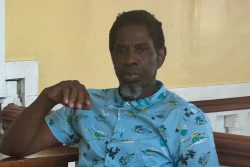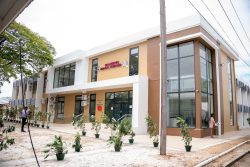News that the Ministry of Human Services and Social Security had recently approached the University of Guyana (UG) with a view to having courses in the Social Work and possibly Sociology programmes tailored to the needs of Guyanese serviced by the ministry is a step in the right direction.
According to a press release from the ministry, its discussions with the university also focused on the feasibility of including certificate and associate programmes in Social Work, as stepping stones to the bachelor’s degree and looking into updating the diploma and master’s degree programmes with emphasis on them being relevant to the local situation. Some of the areas identified as necessary for inclusion, the ministry’s statement said, were stress and anger management, family therapy, counselling, case report writing, elder and child abuse.
Of course, before any of this could be put into practice, UG will need to ensure it has the right resources. It is important to note that in order to tailor or upscale its current programmes the university will need to have lecturers who are versed in these areas, as well as relevant materials such as papers and books.
Minister of Human Services and Social Security Dr Vindhya Persaud, who led the ministry’s team to the talks, pointed out that there are areas not captured by the current programmes. Such a disconnect could only mean that the requisite knowledge does not reside within UG’s teaching corps. If it did it surely would have already been added to the current courses as one assumes the university’s sociologists have a finger on the local pulse.
Lecturers of the calibre required to make the kind of difference necessary cost money and it is well known that this is in short supply at UG. The university, which has two campuses, has two sources of funding — a government subvention and tuition fees — which combined are still insufficient to properly run the institution. For 2021, the former was $3.3 billion as announced during the reading of the budget in February. The latter saw a 10% increase for 2019/2020 as approved by the UG Council in 2017. According to information on UG’s website, certificate, diploma, associate and bachelor’s degrees students pay tuition of $228,448 per year plus an annual $50,000 facilities fee, unless they are in certain specialised programmes, including engineering, medicine and law, where the tuition fees are invariably much higher. It must be noted here that although local tuition costs are more often than not beyond the pocket of the average student, they are well below the norm in western universities.
In an interview with this newspaper shortly after she was appointed last year, UG’s first woman Vice-Chancellor Dr Paloma Mohamed-Martin had stated that on a daily basis there were some 10,000 people (students and staff) using the facilities. While there have been new faculties built on the 1,450-acre Turkeyen campus over its 51 years of existence, maintenance of the older buildings has not been up to par, nor have there been expansions in step with its ever burgeoning student population.
In fact, UG has proven to be a veritable money pit, absorbing whatever is thrown at it and still needing more. Unlike many other tertiary institutions around the world, the University of Guyana has not been the beneficiary of financial bequests which when bestowed without specific instructions can make a huge difference to operation budgets if spent wisely. Neither was it originally set up for wide-scale student accommodation, which in some instances can double student outlay per annum.
It has to be considered then that whenever UG has to dip into its pressured purse to fill a gap, however needful, it sinks itself just a little deeper in that gaping chasm. But perhaps finding a balance will not prove unattainable. If the 20,000 government scholarships on offer are factored in and the promise of free university education from 2024, made by President Irfaan Ali in December last year, likely on the premise of the ‘oil money’ comes to fruition, UG’s problems could very well be at an end. Its financial woes at any rate; the political ones? That’s a whole other story.








